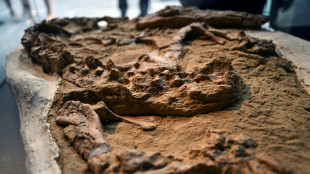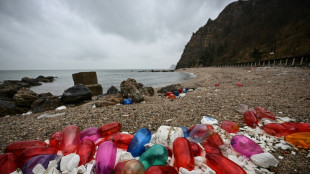
-
 Liberian ex-warlord Prince Johnson dies aged 72
Liberian ex-warlord Prince Johnson dies aged 72
-
K-pop band NewJeans leaves label over 'mistreatment'

-
 Sri Lanka crash to record low Test total of 42 in South Africa
Sri Lanka crash to record low Test total of 42 in South Africa
-
Putin says barrage 'response' to West-supplied missiles

-
 Lebanon MPs seek end to leadership vacuum with January presidency vote
Lebanon MPs seek end to leadership vacuum with January presidency vote
-
Eurozone stocks lift as French political stand-off eases

-
 French farmers wall off public buildings in protest over regulations
French farmers wall off public buildings in protest over regulations
-
France says ready for budget concessions to avert 'storm'

-
 Lampard appointed Coventry manager
Lampard appointed Coventry manager
-
French luxury mogul Arnault defiant at ex-spy chief trial

-
 South Africa bowled out for 191 against Sri Lanka
South Africa bowled out for 191 against Sri Lanka
-
'Europe's best' Liverpool aim to pile pain on Man City

-
 Hezbollah under pressure after war with Israel
Hezbollah under pressure after war with Israel
-
OPEC+ postpones meeting on oil output to December 5

-
 Zelensky slams Russia's 'despicable' use of cluster munitions in energy strikes
Zelensky slams Russia's 'despicable' use of cluster munitions in energy strikes
-
One dead, thousands displaced as floods hit southern Thailand

-
 Lebanon army deploys under Israel-Hezbollah ceasefire
Lebanon army deploys under Israel-Hezbollah ceasefire
-
Imran Khan's wife Bushra Bibi emerges as Pakistan protest figure

-
 COP16 biodiversity talks to restart in February: UN
COP16 biodiversity talks to restart in February: UN
-
Iran to hold nuclear talks with three European powers

-
 French govt ready for budget concessions to avoid financial 'storm'
French govt ready for budget concessions to avoid financial 'storm'
-
Hong Kong airport third runway takes off

-
 In Bosnia, the path to renewables runs through its coal mines
In Bosnia, the path to renewables runs through its coal mines
-
China probes top military official for corruption

-
 Syria war monitor says more than 130 dead in army-jihadist clashes
Syria war monitor says more than 130 dead in army-jihadist clashes
-
China says top military official Miao Hua under investigation

-
 Taiwan president's plan to stop over in Hawaii, Guam angers Beijing
Taiwan president's plan to stop over in Hawaii, Guam angers Beijing
-
Russian attacks leave one million Ukrainians without power

-
 Markets mixed after subdued pre-holiday shift on Wall St
Markets mixed after subdued pre-holiday shift on Wall St
-
What would an ICC arrest warrant for Myanmar's junta chief mean?

-
 China says top military official Miao Hua suspended, under investigation
China says top military official Miao Hua suspended, under investigation
-
Taiwan's Lai to stop over in Hawaii, Guam during Pacific trip

-
 Namibia extends voting after logistical issues
Namibia extends voting after logistical issues
-
LIV Golf's Herbert in charge at Australian Open, Smith two back

-
 Despair in Sweden as gangs recruit kids as contract killers
Despair in Sweden as gangs recruit kids as contract killers
-
Russia launches massive aerial attack on Ukraine's energy sector

-
 Peru scientists unveil crocodile fossil up to 12 million years old
Peru scientists unveil crocodile fossil up to 12 million years old
-
At plastic treaty talks, no united front for industry

-
 Williamson falls for 93 as England fight back in first Test
Williamson falls for 93 as England fight back in first Test
-
South Korea officials say three dead in heavy snowfall

-
 High-flying Fiorentina face test of Scudetto credentials with Inter visit
High-flying Fiorentina face test of Scudetto credentials with Inter visit
-
Verstappen switches focus to re-boot defence of F1 teams' title

-
 UK filmmaker Richard Curtis makes first foray into animation
UK filmmaker Richard Curtis makes first foray into animation
-
Countrywide air alert in Ukraine due to missile threat

-
 China's military corruption crackdown explained
China's military corruption crackdown explained
-
Primark boss defends practices as budget fashion brand eyes expansion

-
 Williamson eyes ton as New Zealand take control against England
Williamson eyes ton as New Zealand take control against England
-
Norway faces WWF in court over deep sea mining

-
 Trump, Sheinbaum discuss migration in Mexico amid tariff threat
Trump, Sheinbaum discuss migration in Mexico amid tariff threat
-
Asian markets mixed after subdued pre-holiday shift on Wall St


New life breathed into Tunisia's bagpipes
At his workshop in Tunisia's capital, Khaled ben Khemis pieces together a type of bagpipe once banned from airwaves but now embraced by artists infusing its sound into new musical styles.
Known as a "mizwad", it "must be made from natural elements", the 50-year-old craftsman said, taking two cow horns and connecting them to pieces of river reed and a goatskin bag for producing the musical notes.
He has made the instrument for 30 years.
Most musical historians agree the mizwad first appeared in Tunisia at the beginning of the 20th century and was confined to working-class suburbs for decades before growing in stature to now be incorporated into other genres, including hip-hop and jazz.
The increased popularity has seen commercial manufacturers turning out mizwads.
But modern variations that replace natural materials with plastic "do not have the soul of those made with reeds", ben Khemis said of the new models, which cost up to 1,000 dinars ($320).
He acknowledged the instrument has, however, evolved.
"Before we played out of tune, and we made it in a hurry," he said.
- Bad image -
The mizwad spawned its own musical style that was frowned upon by authorities for associations with alcohol, drugs and prison -- where many songs were composed.
"It was a musical genre whose reputation was bad just like those who played it," said Noureddine Kahlaoui, a self-described mizwad "activist" aged in his seventies.
"Criminals and those on the run were always found by authorities at mizwad concerts," said the popular artist who has played the instrument for 40 years.
The songs address "daring subjects criticising society, politics, migration and racism", said Rachid Cherif, a musicology researcher.
Mizwad concerts are traditionally held in poor and marginalised neighbourhoods, particularly for weddings.
Song lyrics can be abrasive and considered rude, drawing resentment from families and sometimes triggering brawls at parties.
These elements combined to see Tunisia's authorities ban the mizwad on public television channels until the 1990s -- leading folk artists to undertake a restoration of the instrument's image.
In July 1991, a "Nouba" concert that mixed folk, popular and Sufi music was staged in Carthage's ancient Roman amphitheatre and broadcast on television, marking a fundamental step in the mizwad's rehabilitation.
But some snobbery toward the instrument remains.
In 2022, officials from Tunis's municipal theatre refused to allow a mizwad show, deeming the institution too prestigious to host such a concert.
- Jazz and rap -
"Despite the criticism, we have worked so that this original heritage can progress," said Kahlaoui, who describes the mizwad's evolution as "dazzling".
For the researcher Cherif, "the mizwad occupies a prominent place in the history of Tunisian popular music" due to its fundamental identity. It "consolidates the idea of belonging to a nation, an ethnic group and a culture", he said.
In recent years, a new generation of musicians has taken up the instrument, mixing it with contemporary genres offering more room for creativity such as rap and world music.
"Thanks to what I learnt during my studies, I understood what could be done with this instrument," said Montassar Jebali, 32, who plays mizwad in several jazz and hip-hop ensembles.
Jebali studied Arabic music at the Higher Institute of Music of Tunisia, where the mizwad is not taught.
"I used my academic knowledge to find out which instrument it went well with," he said.
Jebali's concerts and those of other contemporary mizwad players have been popular with young Tunisians.
"The mizwad is gaining ground" and will have its international breakthrough, he said. "Perhaps not tomorrow, but after tomorrow."
P.Anderson--BTB



